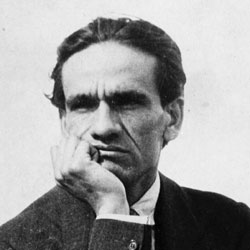Children of the world,
if Spain falls — I mean, it’s just a thought —
if her forearm
falls downward from the sky seized,
in a halter, by two terrestrial plates;
children, what an age of concave temples!
how early in the sun what I was telling you!
how quickly in your chest the ancient noise!
How old your 2 in the notebook!
Children of the world, mother
Spain is with her belly on her back;
our teacher is with her ferules,
she appears as mother and teacher,
cross and wood, because she gave you height,
vertigo and division and addition, children;
she is with herself, legal parents!
If she falls — I mean, it’s just a thought — if Spain
falls, from the earth downward,
children, how you will stop growing!
how the year will punish the month!
how you will never have more than ten teeth,
how the diphthong will remain in downstroke, the gold star in tears!
How the little lamb will stay
tied by its leg to the great inkwell!
How you’ll descend the steps of the alphabet
to the letter in which pain was born!
Children,
sons of fighters, meanwhile,
lower your voice, for right at this moment Spain is distributing
her energy among the animal kingdom,
little flowers, comets, and men.
Lower your voice, for she
shudders convulsively, not knowing
what to do, and she has in her hand
the talking skull, chattering away,
the skull, that one with the braid,
the skull, that one with life!
Lower your voice, I tell you;
lower your voice, the song of the syllables, the wail
of matter and the faint murmur of the pyramids, and even
that of your temples which walk with two stones!
Lower your breath, and if
the forearm comes down,
if the ferules sound, if it is night,
if the sky fits between two terrestrial limbos,
if there is noise in the creaking of doors,
if I am late,
if you do not see anyone, if the blunt pencils
frighten you, if mother
Spain falls — I mean, it’s just a thought —
go out, children of the world, go look for her!…
Notes on the Poem
Readers of poetry in translation feel they're in good hands when renowned translator Clayton Eshleman transforms into English the work in Spanish of César Vallejo, captured so generously in The Complete Poetry: A Bilingual Edition, which was shortlisted for the 2008 Griffin Poetry Prize. "Spain, Take This Cup From Me" is one of the fine examples from this extensive collection. Readers put their trust in translators when reading works in translation for which they (the readers) do not know the original language of the work. The 2008 Griffin Poetry Prize judges clearly were confident in this translator's stewardship of the poet's original work when they observed in their citation"[how Eshleman shows] respect for the original, verification and confirmation not only of what one recognizes as alien or unknown, but of which one seems to know, invention of words in English that will work in a way similar to the Spanish words coined by Vallejo, absolute awareness of the fact that one is creating something else, a different music, different possibilities of sound, wanting only to stay level with the original intentions, turning the already said into something sayable again."Interestingly, other translators can consider the same source material with the same thought and meticulousness ... and craft a notably different translation. That does not necessarily mean that one translation is qualitatively better than another, nor that readers should withhold that trust for one but not the other translator or translation, but the different interpretations will afford readers different experiences, perhaps subtly, perhaps more dramatically. With Eshleman's translation here before you, consider as well this translation by Sandy McKinney (which we'll open in a separate browser window for you). Both renditions have a consistency of tone and voice. Eshleman's parenthetical "I mean, it's just a thought" characterizes a voice that seems somewhat warmer and more colloquial than McKinney's, which renders the same phrase as "I say, it's a manner of speaking", which sounds a bit more formal. Both address the audience directly as "children", although one uses "of the world" and the other "of the earth". Does that difference matter to the reader? Each translator arranges word and meaning with different levels of simplicity or complexity ... "How you'll descend the steps of the alphabet to the letter in which pain was born!" versus "How you are going to go down the steps of the alphabet to the letter in which grief was born." ... but the relative meaning remains intact. Or does it? Does the direct "descend" lend a different connotation than "going to go down" that in turn changes how the reader feels about the destination, which in turn is characterized subtly differently as "pain" in one, "grief" in the other? "if the blunt pencils frighten you" versus "if you are alarmed by pencils without points" again vary in directness and, in turn, perhaps in the seriousness of what the poet and the translator are trying to convey. Discerning readers can read each version as a whole and contained work, and find good reasons to trust them both as accurate representations of what the original poet intended.
